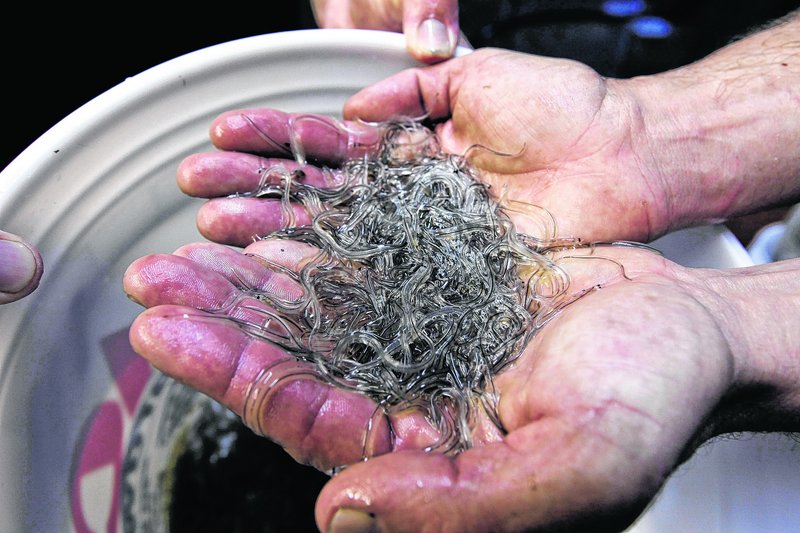AUGUSTA — Lawmakers took initial steps Monday to close what Maine officials described as the last major loophole in monitoring an elver fishery that included as much as $20 million in black market sales of baby eels in 2012.
Under a proposal unanimously endorsed by a legislative committee, Maine would begin licensing the companies or individuals exporting elvers – also known as glass eels – which can fetch hundreds or thousands of dollars a pound. The exporters would be required to use the same real-time monitoring and reporting system that has been widely credited with curtailing illegal activity among elver fishermen and dealers.
“What we are really talking about is creating a bulletproof chain of custody” for elvers caught in Maine and shipped overseas, said Patrick Keliher, commissioner of the Department of Marine Resources, which requested the legislation.
The 2012 elver fishing season was a boom for Maine’s legitimate elver fishermen, and for poachers. The catch reported by the Department of Marine Resources was estimated at $40 million, with a pound of the translucent baby eels averaging more than $1,600. But Keliher told members of the Marine Resources Committee that the actual value of the fishery, accounting for black market sales, could have been as much as $60 million, based on investigations by state and federal agencies.
“There was a lot of illegal activity that year,” Keliher said afterward.
Since then, Maine has implemented a first-in-the-nation reporting system that allows the state to monitor each fisherman’s catch and each dealer’s purchases practically in real time. But exporters, who ship elvers to aquaculture operations in Asia, are not required to participate in that monitoring system.
The electronic swipe card system was hailed as a major success by fishermen, dealers and regulators. It also played a role in convincing federal regulators to allow Maine to continue elver fishing despite concerns about the health of the eel population. Maine and South Carolina are the only two states that allow fishing for glass eels, with Maine accounting for the vast majority of the nation’s catch.
The bill considered Monday, L.D. 1027, would create an exporter’s license and require exporters to use the same credit card-like system that fishermen and elver buyers now use to record every transaction. The bill also would elevate violations to criminal offenses punishable by as much as 364 days in jail and a $2,000 fine.
Keliher described the bill as “the final, important piece of the puzzle.”
“I see this as another step in a series of steps the Legislature and the department are beginning to take to better enforce the law,” added the bill’s sponsor, Rep. Walter Kumiega, D-Deer Isle, a co-chair of the Marine Resources Committee.
The bill appears aimed at capturing out-of-state poachers, now that Maine’s elver catch is so closely monitored and scrutinized.
Maj. Rene Cloutier of the Maine Marine Patrol gave the example of an exporter buying 100 pounds of elvers in Maine. With the electronic tracking system, Marine Patrol agents can now notify their state and federal counterparts in, say, New York, how many elvers that exporter should have when packaging them for final export.
If the exporter shows up with 150 pounds of elvers, that means the exporter likely bought an additional 50 pounds of poached elvers outside Maine.
Committee members voted to make the bill an emergency measure, so it will take effect immediately if it passes in the full Legislature. Lawmakers also voted to impose a $5,000 fee for Maine resident exporters and $7,500 for non-resident exporters, rather than the single $5,000 fee contained in the original bill.
Maine fishermen harvested nearly 9,700 pounds of elvers in 2014, worth an estimated $8.4 million, according to state figures. Although down from roughly 18,000 pounds, valued at $33 million, the year before, the 2014 elver catch still translated into an average of $867 per pound.
The 2015 elver season opened on March 22. But elvers have not begun moving upstream from the ocean because of the cold water in Maine’s rivers and streams. Fishermen have reported catching only 7.5 pounds of elvers to date, Keliher said.
Send questions/comments to the editors.




Comments are no longer available on this story